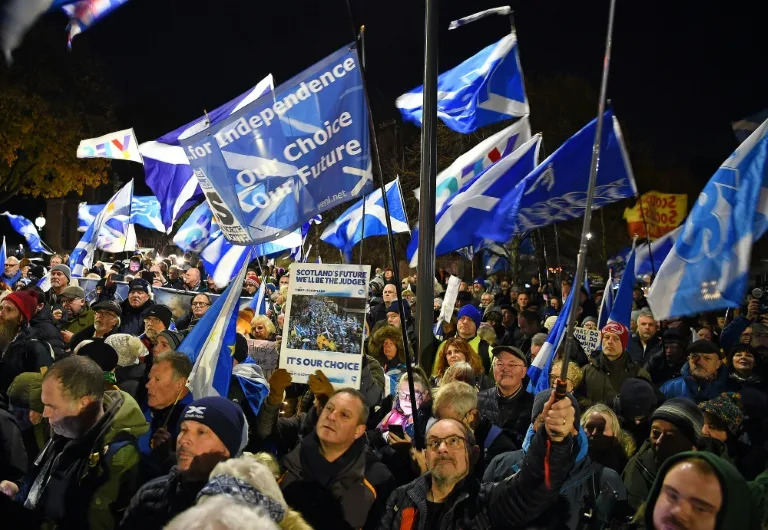Stuart GRAHAM
Sat, 20 April 2024

Support for independence has fallen to between 41 and 43 percent, according to opinion polls (ANDY BUCHANAN)
Scottish independence campaigners will march in Glasgow on Saturday as they try to reignite flagging support for self-rule before a UK general election due this year that is expected to deal a blow to their cause.
A series of setbacks, including a fraud scandal involving Scotland's former first minister Nicola Sturgeon, have left the independence movement at arguably its lowest ebb in recent memory.
The march comes after Sturgeon's husband, Peter Murrell, was charged on Thursday for the embezzlement of £600,000 in donations meant for independence campaigning.
Murrell, the 59-year-old former chief executive of the ruling pro-independence Scottish National Party (SNP), was charged more than a year after he was first arrested.
Sturgeon, who resigned as the devolved UK administration's first minister and SNP leader in February 2023, was arrested in June last year, but released without charge.
On Friday, she described her husband's situation as "incredibly difficult," with current First Minister Humza Yousaf calling it a "really serious matter indeed".
- Independence figurehead -
Sturgeon had established herself as one of the figureheads of the independence movement alongside then Scottish first minister Alex Salmond ahead of an independence referendum in 2014.
Scotland voted against independence, with 55 percent of electors choosing "No", but Sturgeon, 53, put the matter back on the table in 2016 after the UK voted to leave the European Union.
She argued Scotland was being forced out of bloc against its will as Scots had voted overwhelmingly to remain in Europe.
Sturgeon's self-assured leadership and excellent communication skills during the Covid-19 pandemic -- in contrast to the perceived chaos under former prime minister Boris Johnson's Westminster government -- saw support for Scottish independence climb above 50 percent in 2021.
After being refused another referendum by successive prime ministers, Sturgeon took the issue to the UK's top court.
But in November 2022, judges ruled against the Scottish government, saying that the power to grant a referendum was a "reserved" matter for the UK government.
For Westminster, the Supreme Court's ruling was the final word on another Scottish independence referendum.
Sturgeon, who was accused of overplaying her hand, resigned soon after.
Support for independence has since fallen to between 41 and 43 percent, according to three opinion polls taken in April.
- Mandate -
Current SNP leader Yousaf has vowed to continue the push for independence at the UK general election, which is expected to be held in October or November.
He says the SNP will claim "a mandate for independence negotiations" with the British government if it wins at least 29 of the 57 seats up for grabs in Scotland.
The party currently has 43 MPs in Scotland but is expected to lose several to a resurgent Labour Party, which is tipped to form the next government.
The SNP has a seven-point lead over Labour in voting intentions, according to the polling agency Ipsos, but that is down from 12 points a year ago.
"At the next election, page one, line one of our manifesto will say 'vote SNP for Scotland to become an independent country,'" Yousaf told cheering delegates at an SNP conference in Aberdeen in October last year.
Yousaf has also vowed to rejoin the EU as fast as possible, but that won't happen anytime soon with independence not currently on the horizon.
Political observers believe the SNP is fixated on independence and is not focused enough on the cost-of-living crisis that has hit Scotland and the UK.
An editorial in Scotland's Herald newspaper said Yousaf and his team were trying to have conversations with the electorate that few voters want to engage with right now.
"It's dangerous disengagement, and the reason the SNP is sliding towards defeat at the general election," the newspaper said.
John Curtice, a professor of politics at Strathclyde University, said the SNP is facing a chastening Westminster election, with Labour likely to inflict severe damage.
"The party is slowly sinking into an electoral quagmire and is struggling to escape," he wrote in The Times newspaper.
srg/pdh/imm
No comments:
Post a Comment